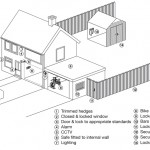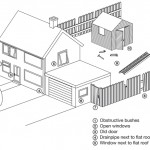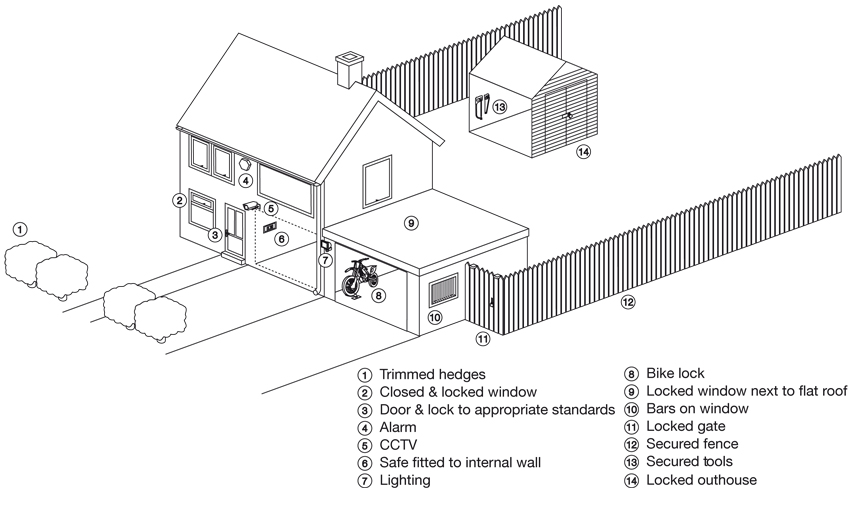 Dr Steffan George, development director at the Master Locksmiths Association,
Dr Steffan George, development director at the Master Locksmiths Association,
offers advice on boosting home security.
Whether you’re a tenant, homeowner or landlord, you want to ensure your home is safe and secure at all times. As a simple tool for boosting home security, the Master Locksmiths Association (MLA) has produced this step-by-step visual guide. Dr Steffan George, development director of the MLA explains
Unsecure House – figure 1
It’s often useful to understand the pitfalls of poor security before beginning to consider what improvements to make to the security of your own home. Figure 1 illustrates the most common areas where security can be compromised in and around your home.
- 1. Obstructive bushes: Check that shrubs and bushes aren’t obscuring your home from view – overgrown greenery can provide cover for burglars.
- 2. Open windows: Try to establish good habits and check that all windows are not only closed but locked before leaving the house.
- 3. Old door: At the MLA we are firm believers that a lock can only be as good as the door or window it is installed into. A lock can only be fully effective if the application of the lock and the door it’s being fitted into is appropriate and the door and frames are in good condition.
- 4. Drainpipe next to flat roof: The combination of a flat roof and a ‘convenient’ drainpipe can make it all too easy for potential intruders to gain access to your home.
- 5. Window next to flat roof: If you do have a flat roof, make sure that any windows within reach have the relevant window lock and where necessary are fortified, either with reinforced glass or bars/grilles.
- 6. Exposed window: Side windows can also increase the vulnerability of your home if you do not reinforce the glass. If the window is next to your front door, ensure that you don’t leave keys in sight.
- 7. Broken & unlocked gate: Gates to your home, whether leading to the front door or the garden present an excellent opportunity for you to increase the security of your home. Don’t lose out by leaving them unlocked and in poor repair.
- 8. Broken fence: Gaps and broken patches in your fence create weak spots where intruders could gain access.
- 9. Unsecure tools: Tools left lying around or unsecured in a shed can be used by burglars to gain entry, so make sure you clear them away and securely store them after use.
10. Open & unlocked shed: There is little point in having a shed to protect and secure valuable tools and machinery if you leave it unlocked and open for anyone to enter.
Secure House – figure 2
Figure 2 shows how just a few changes can ensure your home is safe and secure.
1. Trimmed hedges: Keeping hedges and undergrowth well trimmed ensures a clear view of the surroundings of the house, making it much harder for potential intruders to hide.
- 2. Closed & locked window: As well as making sure all windows are closed and securely locked whenever you leave the house, it is also worth enlisting an MLA locksmith to come and check the locks on your windows to confirm they meet your insurance requirements.
- 3. Door and lock to appropriate standards: Once you have a door which is fit for purpose and in good condition, you need to select an appropriate locking system. Locks should be appropriate to the door type fitted but it is not always easy to know what to look for – especially as there are several different standards. Seek advice from a professional who will be able to install the correct lock to the right specification and appropriate security level.
- 4. Alarm: It’s essential that you remember to set your alarm every time you leave the house. Regularly change your alarm code to ensure that nobody could have memorised it and passed it on.
- 5. CCTV: A CCTV system can help you be vigilant over who approaches your property. It is also proven to be an effective deterrent against attack.
- 6. Safe: Invest in a professionally specified and installed safe to ensure valuable items are properly secured.
- 7. Lighting: Dusk to dawn lighting will not only deter potential thieves; it will also light your way to the door in the dark – and help you search for your keys!
- 8. Bike lock: If you own bikes and other sports equipment stored in sheds or garages, make sure you lock them securely in place to deter theft in the event of a break-in. Fit a ground anchor to lock them too. Look for third party accredited products such as those that have passed Sold Secure testing. See www.soldsecure.com for further information.
- 9. Locked window next to flat roof: Make sure you always keep windows next to flat roofs securely locked, even when you are in the house.
10. Bars on window: Bars or grilles are the most secure way of ensuring that a window does not compromise the security of a building – and with a vast range to choose from you can find a style which does not compromise the aesthetics of your home.
11. Locked gate: Get appropriate locks installed on garden gates to vastly increase the security of your home, as well as sending a deterrent signal to would-be burglars.
12. Secured fence: By keeping your fences in good condition you reduce opportunities for intruders to gain access to your property.
13. Secured tools: Garden tools which are hung up and secured in a locked shed or outbuilding cannot be easily accessed by burglars.
14. Locked outhouse: A secure lock is extremely important. Investing in a strong and solid shed to house your valuable garden and sports equipment is all well and good but this needs to be reinforced by a lock of an appropriate standard to ensure your insurance requirements are met, as well as to protect your belongings.
Top 3 tips for landlords
- 1. Ensure keys can’t be copied – Although a lot of tenancy agreements will stipulate that tenants are not permitted to copy a key without written consent from the landlord, in reality there is often no system in place to actually stop them from doing so.
There will be instances where tenants lose keys and replace them or make spare copies to give to friends or family, which makes tracking keys incredibly difficult.
A sensible way of combating this is to engage a security professional to install a patented key system on your property. Patented keys carry legal protection which prevents copies of the keys being made without proof of ownership. These systems can often be reconfigured if the original key is lost or stolen, rendering lost keys ineffective and eliminating the expense associated with replacing the whole lock.
By installing such a system you are not only protecting your tenants but you are also looking after your investment.
If you let more than one property, a failsafe solution to this is to have a master-key system installed across all of your properties (this can even include your home and office too). This way you can give tenants keys which will only grant access to the property they are renting, while your key will enable you to access all the properties you own
2. Seek advice on HMO regulations
It’s vitally important that you seek professional advice to ensure that your property complies with regulations that apply to houses of multiple occupancy (HMOs), which are properties shared by three or more tenants who are not part of the same family.
HMO regulations include the requirement that bedroom and main exit doors must open from the inside without the use of a key, to allow for easy escape in the case of a fire. Fire doors with self-closers must also be fitted on all bedrooms.
MLA licensed locksmiths will be able to advise on suitable locks, escape routes and fittings such as door closers.
3. Work with the experts
It may be tempting to take a reactive approach to security and only address it in the unfortunate situation of keys being lost or a property broken into. It’s worth bearing in mind that you could save yourself hassle and expense by taking a more proactive approach and working with a trained professional to carry out regular security reviews.
The MLA has just launched a user-friendly resource through its website www.locksmiths.co.uk, where you can search by postcode, region or area of specialism to find approved, vetted and inspected locksmiths local to your property. As there is currently no government-approved regulation of locksmiths, it really does make sense to work with local professionals approved by an organisation such as the MLA. By using MLA licensed locksmiths you can help protect yourself from being scammed by rogue operations, which are sadly on the increase, and also ensure that your tenants are protected by security which is fit for purpose and correctly fitted.




